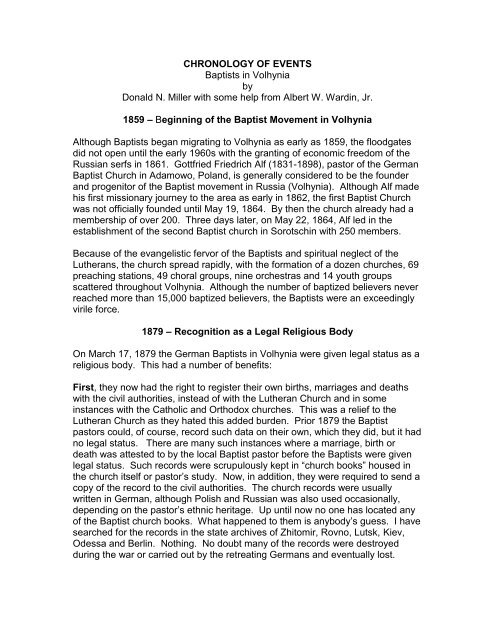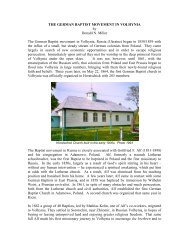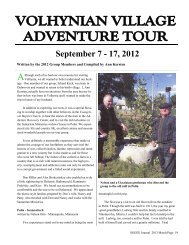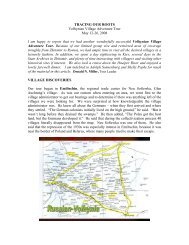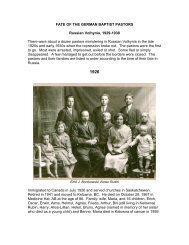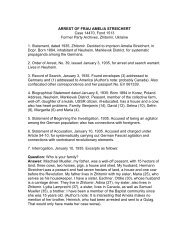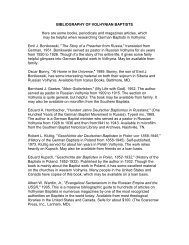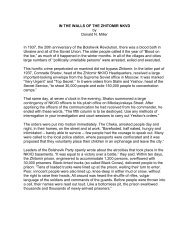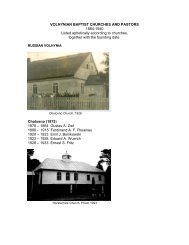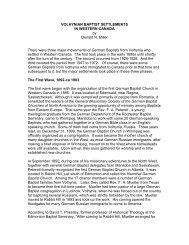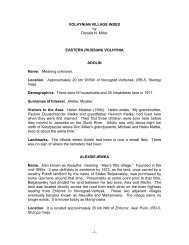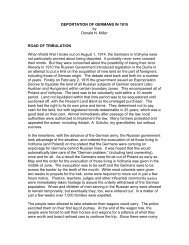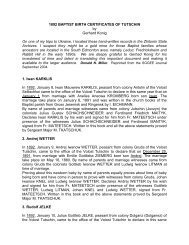SOME CHRONOLOGICAL EVENTS - Volhynia
SOME CHRONOLOGICAL EVENTS - Volhynia
SOME CHRONOLOGICAL EVENTS - Volhynia
Create successful ePaper yourself
Turn your PDF publications into a flip-book with our unique Google optimized e-Paper software.
CHRONOLOGY OF <strong>EVENTS</strong><br />
Baptists in <strong>Volhynia</strong><br />
by<br />
Donald N. Miller with some help from Albert W. Wardin, Jr.<br />
1859 – Beginning of the Baptist Movement in <strong>Volhynia</strong><br />
Although Baptists began migrating to <strong>Volhynia</strong> as early as 1859, the floodgates<br />
did not open until the early 1960s with the granting of economic freedom of the<br />
Russian serfs in 1861. Gottfried Friedrich Alf (1831-1898), pastor of the German<br />
Baptist Church in Adamowo, Poland, is generally considered to be the founder<br />
and progenitor of the Baptist movement in Russia (<strong>Volhynia</strong>). Although Alf made<br />
his first missionary journey to the area as early in 1862, the first Baptist Church<br />
was not officially founded until May 19, 1864. By then the church already had a<br />
membership of over 200. Three days later, on May 22, 1864, Alf led in the<br />
establishment of the second Baptist church in Sorotschin with 250 members.<br />
Because of the evangelistic fervor of the Baptists and spiritual neglect of the<br />
Lutherans, the church spread rapidly, with the formation of a dozen churches, 69<br />
preaching stations, 49 choral groups, nine orchestras and 14 youth groups<br />
scattered throughout <strong>Volhynia</strong>. Although the number of baptized believers never<br />
reached more than 15,000 baptized believers, the Baptists were an exceedingly<br />
virile force.<br />
1879 – Recognition as a Legal Religious Body<br />
On March 17, 1879 the German Baptists in <strong>Volhynia</strong> were given legal status as a<br />
religious body. This had a number of benefits:<br />
First, they now had the right to register their own births, marriages and deaths<br />
with the civil authorities, instead of with the Lutheran Church and in some<br />
instances with the Catholic and Orthodox churches. This was a relief to the<br />
Lutheran Church as they hated this added burden. Prior 1879 the Baptist<br />
pastors could, of course, record such data on their own, which they did, but it had<br />
no legal status. There are many such instances where a marriage, birth or<br />
death was attested to by the local Baptist pastor before the Baptists were given<br />
legal status. Such records were scrupulously kept in “church books” housed in<br />
the church itself or pastor’s study. Now, in addition, they were required to send a<br />
copy of the record to the civil authorities. The church records were usually<br />
written in German, although Polish and Russian was also used occasionally,<br />
depending on the pastor’s ethnic heritage. Up until now no one has located any<br />
of the Baptist church books. What happened to them is anybody’s guess. I have<br />
searched for the records in the state archives of Zhitomir, Rovno, Lutsk, Kiev,<br />
Odessa and Berlin. Nothing. No doubt many of the records were destroyed<br />
during the war or carried out by the retreating Germans and eventually lost.
Second, they now had the right to build their own houses of worship and<br />
schools, though the law still required that they obtain permission to do so from<br />
the Government. Often this took a long time with many denials before official<br />
permission was granted. For example, the Baptist Church in Nowo Rudnia<br />
became self-supporting in 1884, but it was not given permission to construct a<br />
new building until 1908, though the church applied for permission each year.<br />
With these rights, however, also came the requirement that pastors take an oath<br />
of allegiance to the Government. Perhaps this is why some of the churches<br />
carried a motto on the walls of their churches, which read “Fear God and Honor<br />
the Tsar.”<br />
1887 – Formation of the Union of Baptist Churches in Russia<br />
In September 1887 the Union of Baptist Churches in Russia was formed in<br />
Neudorf. Alf was one of the special speakers for the occasion and was chosen<br />
as its first president, an office he held until his death. Prior to that the churches<br />
in <strong>Volhynia</strong> were members of German Bund or Union in Germany, which was the<br />
supreme organization binding several regional organizations together. But at the<br />
triennial convention of the German Bund in Berlin in 1885, the representatives<br />
from Russia announced their need for a separate Union of Baptist churches in<br />
Russia. There was some resistance to the idea, primarily from the<br />
representatives of the German Bund, but Alf defended the decision to form such<br />
union in Russia. He based his arguments on the distance from Germany (some<br />
700-800 miles), the difficulty of getting a pass and its high cost, and the ability to<br />
promote better mission work. He said that he favored separate mission funds,<br />
but that the other funds should remain undivided. When others also argued in<br />
favor of a separate union, the German Union agreed, aside from the mission<br />
fund, to keep its other funds open to the churches in Russia and wished them<br />
God’s riches blessing.<br />
1899 – Publication of German Church Periodical<br />
In 1890 Der Hausfreund (Friend of the House), a German church periodical, was<br />
published in Riga, Latvia by the German Baptist Union in Berlin. It initially<br />
appeared the previous year under the name Der Hirtenbrief (The Pastor’s Letter)<br />
and was edited by Julius Hermann. The periodical was widely circulated in the<br />
German Baptist churches in Germany, Poland and Russia (<strong>Volhynia</strong>). In 1915,<br />
with the advance of the German Army and deportation of the Germans to Siberia,<br />
the periodical was discontinued until 1920. In 1920 it was resurrected and<br />
published in Lodz. Distribution in Russia, however, was limited to Polish<br />
<strong>Volhynia</strong>. In 1926 Der Familienfreud, its counterpart was published in Odessa<br />
and distributed only to the churches in Russian <strong>Volhynia</strong>.<br />
1915 – Abandonment of the Baptist Churches
In 1915, with the expropriation of land and deportation of the Germans to Siberia<br />
and Central Asia, the people had no choice but to abandon their houses of<br />
worship. Because the area was re-settled by the Galacians, many of the<br />
churches were taken over by them. However, upon return of the Germans in late<br />
1917 and subsequent years, and with the help of the German Army, the<br />
Germans were able to reclaim most of their churches, even though they had<br />
sustained considerable damage. Soon the entire Baptist movement was thriving<br />
once again, in spite of the lack of workers, literature and finances. There were<br />
many spiritual awakenings, which resulted in numerous conversions.<br />
1925 – Formation of the All-Ukrainian Union of Association of Baptists<br />
In May 1925 an “All-Ukrainian Union of Association of Baptists” was formed. The<br />
union was comprised of both Ukrainian and German Baptists. After the union<br />
was registered with the Commission of Internal Affairs, the German section or<br />
branch was given permission to publish its own religious periodical, print<br />
calendars, issue a new hymnal and open a theological school for the training of<br />
ministers. In the latter part of November 1925, the German Baptists held their<br />
first and only General Conference in Odessa.<br />
Three years later the Communist Party began to restrict the activities of the<br />
churches and harass the pastors. By the end of 1928, the denominational<br />
periodical Der Familienfreud (Friend of the Family) was forced to cease<br />
publication and in 1930 the GPU (Secret Police) arrested the top three<br />
denominational leaders and closed down the Baptist seminary, printing office and<br />
denominational headquarters.<br />
1937 – Closure of the Baptist Churches in Russian <strong>Volhynia</strong><br />
In the early 1930s the Government started arresting the pastors and closing<br />
down the churches in Russian <strong>Volhynia</strong>. Because Polish <strong>Volhynia</strong> was not under<br />
the control of Russia at that time, the repression did not affect the churches in<br />
that area. That came later with the invasion of Poland by Germany. But in<br />
Russian <strong>Volhynia</strong> the churches were closed one by one until the church in<br />
Zhitomir, led by Eduard A. Hornbacher, was also closed at the beginning of<br />
1937. This occurred after the arrest of Hornbacher in the spring of 1936 when<br />
the church could no longer afford to pay the ever-increasing taxes imposed by<br />
the Government.<br />
1939 – End of the Baptist Churches in Polish <strong>Volhynia</strong><br />
In September 1939, with the invasion of Poland by Hitler, the churches and<br />
pastors in Polish <strong>Volhynia</strong>, came under similar fire as in Russian <strong>Volhynia</strong>.<br />
Some of the pastors were arrested and the churches put in jeopardy. Finally, in<br />
late 1939 and early 1940, when the Germans were re-settled to Occupied<br />
Poland, all the churches were closed. Robert L. Kluttig, pastor of the Baptist
church in Porozow, was the last pastor to leave on February 2, 1940. And with<br />
that the Baptist movement in <strong>Volhynia</strong> ended.<br />
1941 – Re-Opening of the Churches in Russian <strong>Volhynia</strong><br />
In 1941, two months before the German invasion of Ukraine, Hornbacher was<br />
allowed to return to Zhitomir from a five-year term in a Gulag. Almost<br />
immediately, upon the occupation of Ukraine by the German Army, the churches<br />
in <strong>Volhynia</strong> were again opened and permitted to function. During this time, from<br />
1941 to 1943, Hornbacher, the only remaining German Baptist pastor in<br />
<strong>Volhynia</strong>, was the leading voice in a great spiritual revival in the Zhitomir region.<br />
Hundreds of people, mostly young adults, were baptized in a single service.<br />
1943 – End of the Baptist Movement in <strong>Volhynia</strong><br />
In November 1943, with the retreat of the German Army and the resettlement of<br />
the Germans to occupied Poland, the Baptist movement in <strong>Volhynia</strong> ceased to<br />
exist. Today there are few Germans remaining in <strong>Volhynia</strong> and no German<br />
Baptist churches, only Ukrainian.<br />
End.


